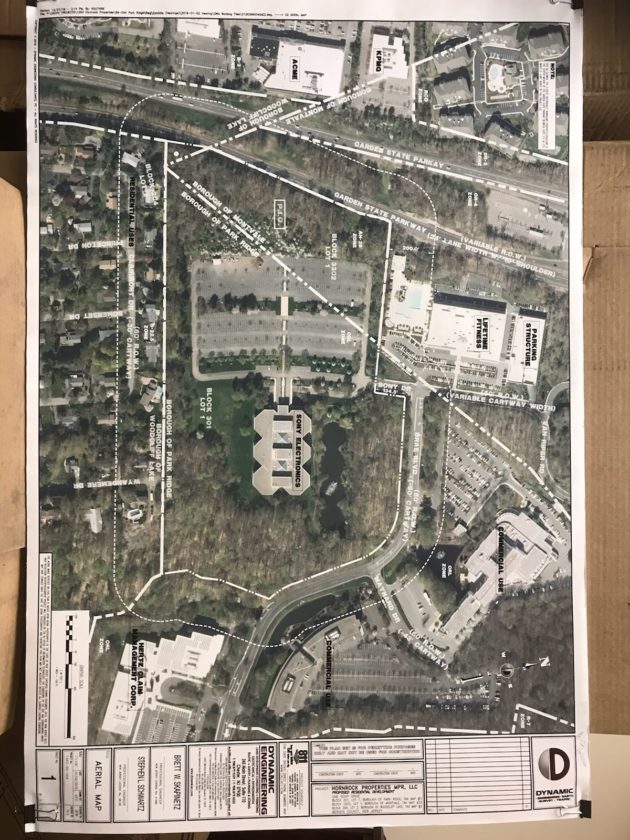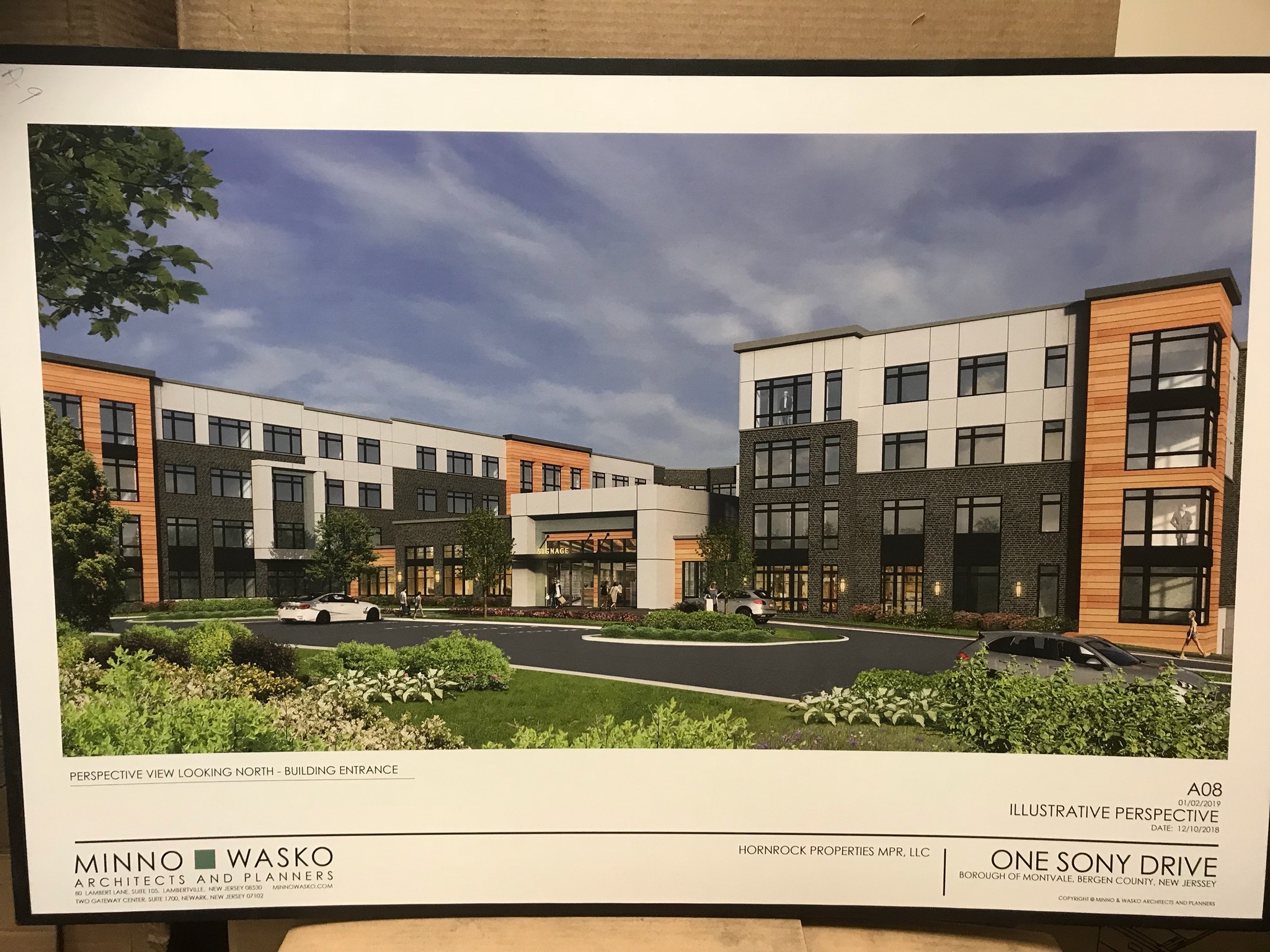
MONTVALE, N.J.—Planners unanimously decided April 16 to request the board attorney prepare a resolution granting preliminary approval for a 185-unit, 50-foot-high development on a seven-acre site that straddles boundaries with Park Ridge, Woodcliff Lake and the Garden State Parkway.
The resolution will be prepared for consideration at the June 18 meeting, said Board Attorney Robert Regan.
After more than 2 1/2 hours of testimony and public comments—including the last opportunity for public comment on the proposal before a June board vote—Regan said the June 18 meeting was the soonest a detailed resolution stating all conditions for preliminary approval could be prepared and considered.
The development will provide 37 affordable housing units for Montvale on a 7-acre site in the borough’s newly rezoned AH-26 affordable housing zone.
The affordable housing units are part of Montvale’s affordable housing settlement approved in early 2018.
The proposed development site touches the boundaries of Woodcliff Lake, Park Ridge and the Garden State Parkway.
Only Park Ridge has sent attorney Carmine Alampi to all four hearings; an attorney representing Woodcliff Lake attended the first hearing but none after that.
Hornrock v. Park Ridge
In Park Ridge, Hornrock is an intervenor in the borough’s affordable housing settlement, and is hoping to build up to 972 units—or more—on an adjoining 30-acre property, which Park Ridge has opposed for years in Superior Court.
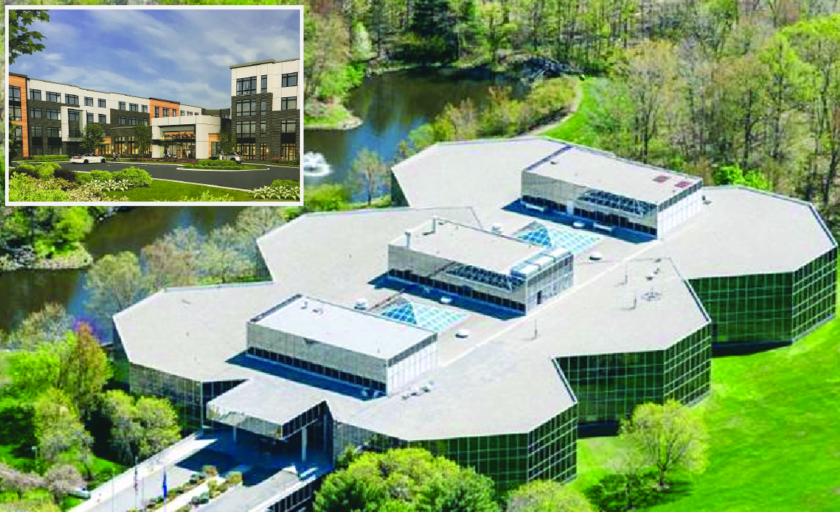
A case conference before Superior Court Judge Gregg Padovano scheduled for April 1 on Park Ridge’s proposed affordable settlement plan was postponed and no new date was set by press time.
Previously, the judge said he will set a trial date if the two sides do not settle soon.
In addition, as part of its final site plan approval, Hornrock Properties has applied to Park Ridge Zoning Board of Adjustment for approval of an access road on about an acre of land that provides access from Sony Drive to the 185-unit development in Montvale.
That hearing is set for Tuesday, May 21 at 8 p.m. at Park Ridge Borough Hall.
Hornock is requesting a use variance to permit the driveway use on Park Ridge property and a bulk variance to permit less than the number of parking spaces on a Park Ridge lot to support the existing office building. The office building is unoccupied except for Hornrock Properties’ staff.
The April 16 Montvale hearing featured previous board questions being answered by engineer Brett Skapinetz, who ticked off concerns voiced by borough engineer Andrew Hipolit, and additional testimony from Nicholas Vederese, Hornrock’s traffic engineer.
Both applicant engineers are from Dynamic Engineering, Chester.
Traffic signal not needed
Vederese said he updated the traffic study counts to include specific developments in town including DiPiero Farms and 3 Mercedes Dr. to help project future traffic volumes in the area and argued with Park Ridge special counsel Carmine Alampi over whether a traffic light was needed due to increased traffic from the development.
“Our traffic counts are recent,” said Vederese.
“We don’t just willy-nilly install traffic signals at intersections,” he said in one exchange with Alampi when Alampi pressed for a new signal to help anticipated traffic flow. He said a traffic signal was not needed.
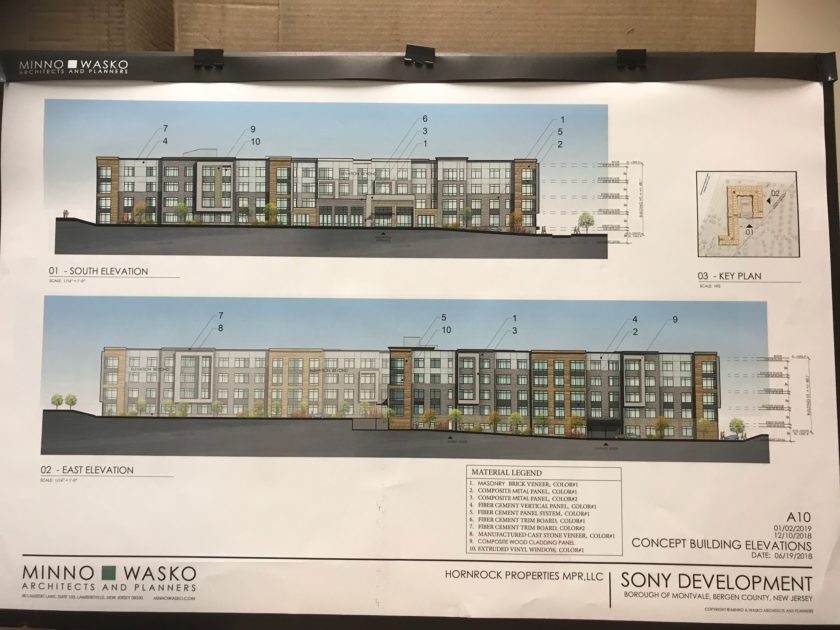
Vederese said the traffic impact study did take into account a full build-out of adjoining 30-acre Park Ridge property, calculating it for vehicles from 972 units.
Skapinetz said he addressed 90 percent of Montvale’s concerns, including questions about fire department emergency access, driveway widths, and fire hydrant locations.
Other concerns addressed included a new discharge point for storm basin overflows, retaining walls around storm detention basins, and clarified plans for signage, chainlink fencing height (4 foot) and sidewalks.
Applicant attorney Peter Wolfson said Hornrock submitted a number of revised documents, including architectural plans, tree survey, a phase one environmental impact statement, a pesticide screening report, a stormwater summary and a stormwater operation and maintenance manual.
Regan mentioned that the planners could not change the density of the development—which came under fire by at least two Park Ridge residents at the hearing —with Regan noting the housing density (units per acre) was approved in Montvale’s affordable housing settlement plan.
When Park Ridge resident David O’Sullivan challenged the decision to allow 185 units on seven acres, he also alleged Planning Board “manipulation” occurred that allowed 185 units when fewer were originally proposed.
O’Sullivan claimed that the original settlement was for 67 townhomes, not 185 units, and said “it sounds like they had 185 units in mind and you guys worked backwards. [You] bent over backwards to the will of Hornrock to the detriment of the tri-borough,” he said.
Regan took exception to O’Sullivan’s comments and asked if O’Sullivan attended the fairness hearing on Montvale’s affordable plan—which was the final opportunity the public had to comment on the settlement plan. O’Sullivan said he did not attend the hearing.
Chairman John DePinto calmed the heated exchange by noting though “we may agree or disagree with” O’Sullivan, but “as a member of the public Mr. O’Sullivan has a right to offer his opinions.”
O’Sullivan then criticized Regan for efforts to “intimidate and silence the public” and asked for an apology, which he did not get.
‘No challenge to settlement’
“The fact of the matter is the court approved the settlement and there was no challenge to the settlement,” Regan said. “We get it and you don’t like the settlement,” Regan retorted.
DePinto said one regret he had was that Montvale could not work cooperatively with Park Ridge to deal with Hornrock, which came to both towns years ago to work on a plan to provide affordable housing in both towns.
DePinto said both towns working together “would have been a better plan.”
He said the two towns not working cooperatively “is the most unfortunate aspect of this entire thing.”
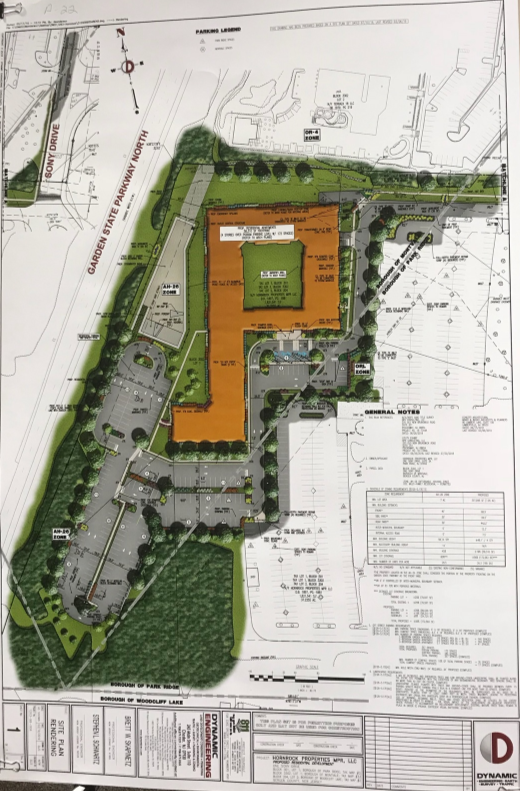
Member Robert Zitelli said though the property is “a very difficult site to develop” he did not see any reason to oppose the plan. Member Jeff Fette said he was “very satisfied with the plan.”
Planner Frank Stefanelli said though Montvale “didn’t ask for [Council on Affordable Housing]. Most of people on the board have worked hard to be in compliance.”
Councilwoman Rose Curry said she was glad Hornrock worked with them but was “concerned” about future development on the adjacent property in Park Ridge.
She criticized Park Ridge for not being concerned when putting up a high-density Kinderkamack Avenue development, and added: “Park Ridge had to do for the benefit of Park Ridge and Montvale is having to do what Montvale is having to do.”
‘The best plan’ for Montvale
Mayor Michael Ghassali said “no one likes overdevelopemnt and we didn’t come here and say ‘let’s start building stuff’,” he said. Ghassali took issue with public criticism calling for lower-density development, noting the 185-unit development, with 20 percent affordable units was “the best plan” for Montvale.
Ghassali said Montvale’s settlement plan provided “a surplus (of affordable housing credits) we can be proud of.”
He said before the settlement, developers were regularly calling with plans to build much higher-density developments.
“Do we like it overall? No, but it’s our obligation,” said Ghassali. He said about 45 extra affordable credits were provided by the settlement plan, which may be used to satisfy future affordable housing obligations.
Earlier, Regan had noted two municipalities—South Brunswick and West Windsor—who opposed their affordable housing obligations in court. “Every case has gone against municipalities …they’re batting zero,” said Regan.
DePinto noted the resolution is for preliminary approval, and will come back for a final approval after an access road application is heard in Park Ridge.
“You still have to cross the T’s and dot the I’s—that’s when the board will make sure this is a perfect development,” he said.
Previously, Ghassali and Park Ridge Mayor Keith Misciagna had joined forces last summer to publicly criticize the state’s affordable housing court-mediated process and both claimed it favored developers and forced “overdevelopment” and high-density housing on municipalities.
During a mayors breakfast in April, State League of Municipalities Deputy Executive Director Michael Cerra said roundtables addressing cannabis legalization and affordable housing were being held statewide in April to update local officials on proposed legislation and concerns.
